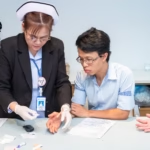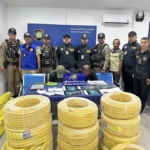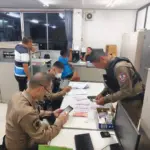TAIPEI – A Thai mother was detained in Taiwan on Saturday, accused of trafficking her 12-year-old daughter into sexual exploitation at a Tokyo massage parlor. The child’s account, which includes serving up to 60 men in one month, sheds light on cross-border trafficking rings that profit from minors.
Authorities have not released the mother’s name, pending formal charges. Investigators say she brought her 12-year-old daughter to Japan in late June on a 15-day tourist visa. Instead of touring the city, the girl was taken to a private-room massage parlor in Tokyo’s Bunkyo Ward.
The business was run by Masayuki Hosono, a 51-year-old Japanese national arrested last week on suspicion of illegal child employment and exploitation. Tokyo police say the mother coached her daughter on sexual acts, then left Japan in mid-July.
The child, who did not speak Japanese, lived in a small room above the shop. Police estimate she earned more than ¥600,000, about $3,900, which was routed to an account tied to the mother’s contacts.
“I thought we would die if I didn’t work,” the girl told police, echoing the fear her mother cited to justify her actions. The mother promised to return, but never did. Isolated and abused, the child sought help in September at the Tokyo Regional Immigration Services Bureau.
Japanese officials took her into protective custody, where she remains under expert care.
A Quiet Cry for Help Inside a Fake Massage Parlor
The parlor posed as a regular massage shop, but catered to buyers seeking illegal services. Several Thai women worked there alongside the minor. Investigators say Hosono ignored labor laws and visa rules and used the girl’s age and status for profit.
After the first month, the girl was moved to a similar setup in another prefecture, a transfer police say the mother arranged. The cycle continued until authorities intervened.
The girl is now safe in a secure care facility. She is receiving counseling, medical checks, and education support. Officials say she is helping investigators and showing strong progress, though the trauma runs deep.
“She is brave,” a child protection spokesperson said. “Healing takes time, and we are focusing on her recovery and the best long-term care plan.” The Royal Thai Embassy in Tokyo is assisting with translators and cultural support.
Cross-Border Arrest of the Thai Mother
Taiwanese police arrested the mother on November 8 in Taipei during an immigration check, acting on a request from Thai authorities. She entered Taiwan in September and was reportedly active in the sex trade there, a pattern the girl described to investigators.
The mother was first held on prostitution-related grounds. She now faces extradition to Thailand to answer human trafficking charges under the Anti-Trafficking in Persons Act. If convicted of exploiting a minor for commercial sex, she could receive up to 20 years in prison and fines of over 2 million baht, about $60,000.
Royal Thai Police Commissioner General Kitthirath Panphet called the arrest “a critical breakthrough.” “We sought Taiwan’s help immediately after the rescue,” he said in Bangkok. “This is bigger than one family. It targets cross-border groups that abuse our children.”
Thailand’s Department of Special Investigation is tracking the mother’s money flows and possible partners, working with Interpol. The Thai Embassy in Tokyo supported Japanese police in detaining Hosono, reflecting closer cooperation between the two countries. “We will repatriate the child when doctors say she is ready,” a consular official added, noting a trauma-informed plan.
Thailand’s Ongoing Trafficking Crisis
This case reflects a wider child trafficking problem in Thailand. The country is a source, transit, and destination point. Each year, many minors are pulled into sexual exploitation. The U.S. Department of State’s 2022 Trafficking in Persons Report notes that children from Thailand, Myanmar, Laos, and Cambodia are abused in brothels, massage businesses, and online.
The UNODC’s Global Report on Trafficking in Persons says sexual exploitation makes up about half of all cases, with Asia-Pacific accounting for a large share of child victims.
Advocacy groups report dire numbers. Myriad Canada estimates 60,000 Thai children are exploited each year. Wikipedia’s summary of reports points to nearly 40,000 under-16s in the sex trade in venues across the country.
ECPAT International warns that rural poverty, migration, and online grooming raise risks. Many migrant children are out of school and lack health coverage, which makes them easy targets for recruiters using social media. In 2021, Thai authorities formally identified only two child labor trafficking victims, a figure watchdogs say misses the scale of the problem, which includes forced begging and domestic work.
Analysts blame weak enforcement and stigma that keep victims quiet. A UNICEF report notes that some families enable abuse due to poverty. It also cites data showing that bout 9% of Thai youth faced online sexual harm in a single year. Thailand joined a regional pact in 2015 and passed new laws in 2022 to strengthen protections. Gaps remain, including low access to health insurance for migrant workers.
A Push for Accountability and Change
The Tokyo case needs more than arrests; it demands firm reform. The girl’s grandparents in northern Thailand, who raised her before the trip, say they are heartbroken. “We trusted her mother. How could this happen?” they said, speaking for many families left in shock.
International pressure is growing. The EU has flagged labor abuses in Thai supply chains, and groups like The Exodus Road are calling for tougher border checks. Thai officials promise broader awareness campaigns, including a new app to report suspected trafficking. Critics say funding trails behind the promises.
For the 12-year-old, safety and justice are the first steps. Her story is not only a headline, it is a warning for those who cannot speak. Stopping this trade requires joint action across borders, steady support for survivors, and a system that puts children first.














